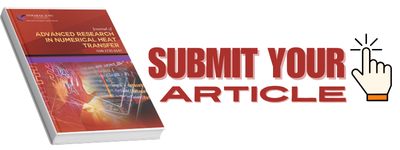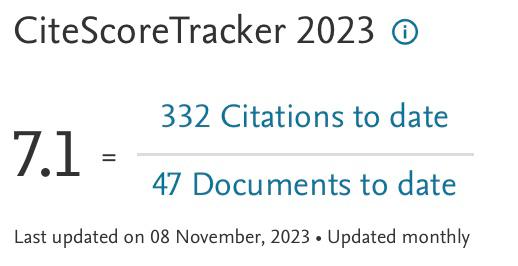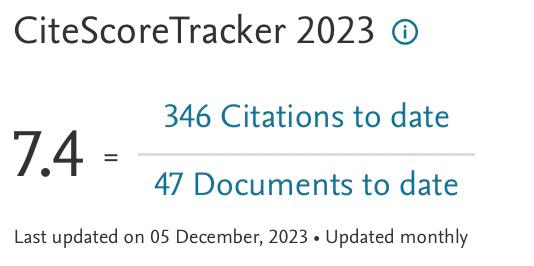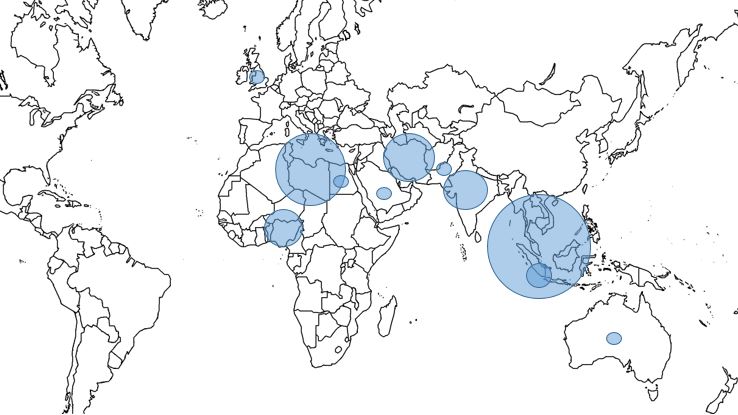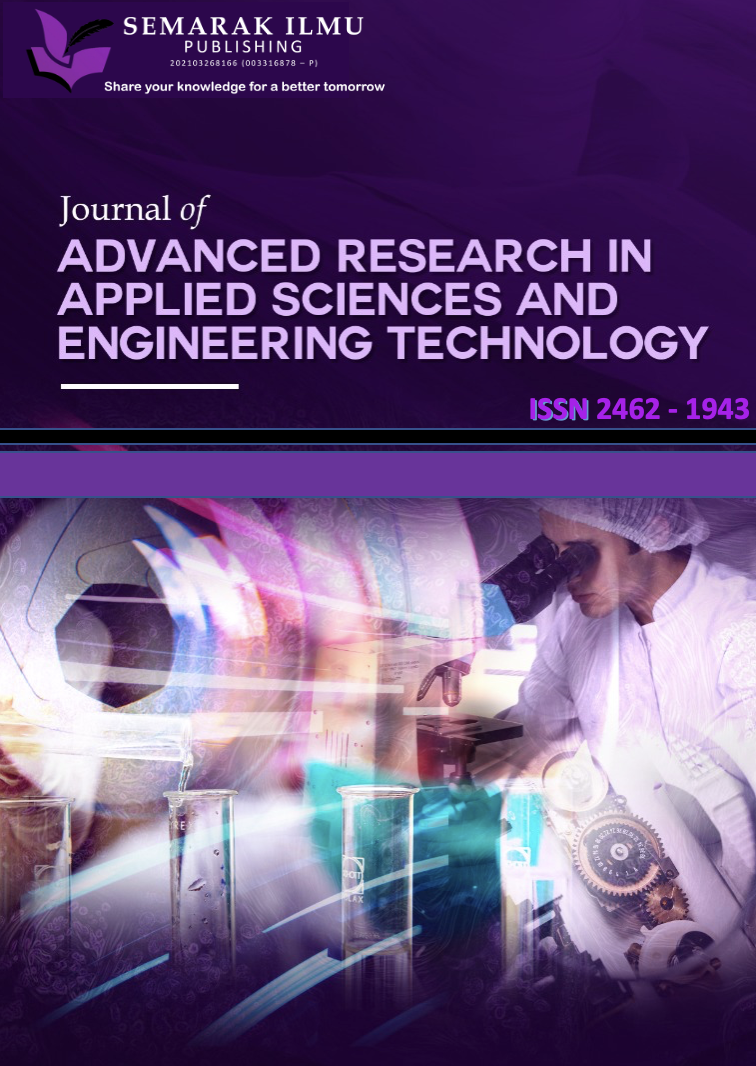Numerical Investigation on the Influence of Substrate Board Thermal Conductivity on Electronic Component Temperature Regulation
DOI:
https://doi.org/10.37934/arnht.23.1.2837Keywords:
IC chips, optimal arrangement, SMPS board, Thermal ManagementAbstract
This study presents a detailed numerical analysis of substrate boards made from various materials (FR-4, Si cladding, and Cu cladding) with nine electronic components mounted on them. Each component is subjected to different heat fluxes, and the analysis covers both natural convection (NC) and forced convection (FC) modes of heat transfer at air velocities of 4m/s and 6m/s. The findings reveal that at an air velocity of 6m/s, using a copper cladding board significantly lowers the temperatures of the electronic components by 340C to 540C compared to FR-4 and Si cladding boards. Additionally, the copper cladding reduces the required air-cooling velocity by 2m/s and achieves a temperature reduction for the IC chips ranging from 3.500C to 13.120C. It is recommended to use an air velocity of 4m/s with copper cladding to minimize fan power consumption while maintaining component temperatures below 1250C. These results provide crucial insights for thermal design engineers, aiding in the selection of appropriate substrate boards for effective thermal management of electronic components. The study emphasizes the benefits of copper cladding in distributing heat more uniformly, reducing energy consumption, and maintaining optimal operating temperatures. Furthermore, it suggests that placing high heat-dissipating components at inlet or outlet points can minimize thermal interactions and overall configuration temperatures. The research offers valuable guidance to the heat transfer community, particularly electronic thermal designers, by highlighting the importance of substrate material choice and component placement in enhancing the reliability and lifespan of integrated circuits (ICs). The comprehensive analysis and recommendations serve as a vital resource for optimizing thermal control strategies in electronic devices, ultimately contributing to improved performance and durability.
Downloads
References
Kurhade, Anant Sidhappa, T. Venkateswara Rao, V. K. Mathew, and Naveen G. Patil. "Effect of thermal conductivity of substrate board for temperature control of electronic components: A numerical study." International Journal of Modern Physics C 32, no. 10 (2021): 2150132. https://doi.org/10.1142/S0129183121501321 DOI: https://doi.org/10.1142/S0129183121501321
Kurhade, Anant, Virendra Talele, T. Venkateswara Rao, Archana Chandak, and V. K. Mathew. "Computational study of PCM cooling for electronic circuit of smart-phone." Materials Today: Proceedings 47 (2021): 3171-3176. https://doi.org/10.1016/j.matpr.2021.06.284 DOI: https://doi.org/10.1016/j.matpr.2021.06.284
Rahman, Muhammad M., and Jagannath Raghavan. "Transient response of protruding electronic modules exposed to horizontal cross flow." International journal of heat and fluid flow 20, no. 1 (1999): 48-59. https://doi.org/10.1016/S0142-727X(98)10031-0 DOI: https://doi.org/10.1016/S0142-727X(98)10031-0
Dogan, A., M. Sivrioglu, and S. Baskaya. "Experimental investigation of mixed convection heat transfer in a rectangular channel with discrete heat sources at the top and at the bottom." International Communications in Heat and Mass Transfer 32, no. 9 (2005): 1244-1252. https://doi.org/10.1016/j.icheatmasstransfer.2005.05.003 DOI: https://doi.org/10.1016/j.icheatmasstransfer.2005.05.003
Yadav, Vipin, and Keshav Kant. "Air cooling of variable array of heated modules in a vertical channel." (2007): 205-215. https://doi.org/10.1115/1.2721594 DOI: https://doi.org/10.1115/1.2721594
Alves, Thiago Antonini, and Carlos AC Altemani. "Convective cooling of three discrete heat sources in channel flow." Journal of the Brazilian Society of Mechanical Sciences and Engineering 30 (2008): 245-252. https://doi.org/10.1590/S1678-58782008000300010 DOI: https://doi.org/10.1590/S1678-58782008000300010
Yusoff, S., M. Mohamed, K. A. Ahmad, M. Z. Abdullah, Muhammad Abdul Mujeebu, Z. Mohd Ali, F. Idrus, and Y. Yaakob. "3-D conjugate heat transfer analysis of PLCC packages mounted in-line on a Printed Circuit Board." International Communications in Heat and Mass Transfer 36, no. 8 (2009): 813-819. https://doi.org/10.1016/j.icheatmasstransfer.2009.04.013 DOI: https://doi.org/10.1016/j.icheatmasstransfer.2009.04.013
Narasimham, G. S. V. L. "Natural convection from discrete heat sources in enclosures: an overview." Vivechan Int J Res 1 (2010): 63-78. https://doi.org/10.1080/08916152.2020.1793827 DOI: https://doi.org/10.1080/08916152.2020.1793827
Pirasaci, T. O. L. G. A., and M. Sivrioglu. "Experimental investigation of laminar mixed convection heat transfer from arrays of protruded heat sources." Energy conversion and management 52, no. 5 (2011): 2056-2063. https://doi.org/10.1016/j.enconman.2010.12.033 DOI: https://doi.org/10.1016/j.enconman.2010.12.033
He, Jing, Liping Liu, and Anthony M. Jacobi. "Conjugate thermal analysis of air-cooled discrete flush-mounted heat sources in a horizontal channel." (2011): 041001. https://doi.org/10.1115/1.4005299 DOI: https://doi.org/10.1115/1.4005299
Yu, Lihang, Binbin Jiao, Yuxin Ye, Xiangbin Du, Yanmei Kong, Ruiwen Liu, Jingping Qiao et al. "An adaptive thermal management method via bionic sweat pores on electronic devices." Applied Thermal Engineering 247 (2024): 122953. https://doi.org/10.1016/j.applthermaleng.2024.122953. DOI: https://doi.org/10.1016/j.applthermaleng.2024.122953
Liu, Yang, Ruowei Zheng, and Ji Li. "High latent heat phase change materials (PCMs) with low melting temperature for thermal management and storage of electronic devices and power batteries: Critical review." Renewable and Sustainable Energy Reviews 168 (2022): 112783. https://doi.org/10.1016/j.rser.2022.112783 DOI: https://doi.org/10.1016/j.rser.2022.112783
Ajmera, Satish Kumar, and A. N. Mathur. "Experimental investigation of mixed convection in multiple ventilated enclosure with discrete heat sources." Experimental Thermal and Fluid Science 68 (2015): 402-411. https://doi.org/10.1016/j.expthermflusci.2015.05.012 DOI: https://doi.org/10.1016/j.expthermflusci.2015.05.012
Chaurasia, N. K., S. Gedupudi, and S. P. Venkateshan. "Conjugate mixed convection with discrete heat sources in a rectangular channel with surface radiation." In Journal of Physics: Conference Series, vol. 745, no. 3, p. 032031. IOP Publishing, 2016. https://doi.org/10.1088/1742-6596/745/3/032031 DOI: https://doi.org/10.1088/1742-6596/745/3/032031
Bejan, Adrian, George Tsatsaronis, and Michael J. Moran. Thermal design and optimization. John Wiley & Sons, 1995.
Kurhade, Anant Sidhappa, and G. Murali. "Thermal control of IC chips using phase change material: A CFD investigation." International Journal of Modern Physics C 33, no. 12 (2022): 2250159. https://doi.org/10.1142/S0129183122501595 DOI: https://doi.org/10.1142/S0129183122501595
Kurhade, Anant Sidhappa, G. Murali, and T. Venkateswara Rao. "CFD Approach for Thermal Management to Enhance the Reliability of IC Chips." https://doi.org/10.14445/22315381/IJETT-V71I3P208 DOI: https://doi.org/10.14445/22315381/IJETT-V71I3P208
Patil, Suhas Prakashrao, Sandeep Sadashiv Kore, Satish Suresh Chinchanikar, and Shital Yashwant Waware. "Characterization and Machinability Studies of Aluminium-based Hybrid Metal Matrix Composites–A Critical Review." Journal of Advanced Research in Fluid Mechanics and Thermal Sciences 101, no. 2 (2023): 137-163. https://doi.org/10.37934/arfmts.101.2.137163 DOI: https://doi.org/10.37934/arfmts.101.2.137163
Waware, Shital Yashwant, Sandeep Sadashiv Kore, and Suhas Prakashrao Patil. "Heat Transfer Enhancement in Tubular Heat Exchanger with Jet Impingement: A Review." Journal of Advanced Research in Fluid Mechanics and Thermal Sciences 101, no. 2 (2023): 8-25. https://doi.org/10.37934/arfmts.101.2.825 DOI: https://doi.org/10.37934/arfmts.101.2.825
Waware, Shital Yashwant, Sandeep Sadashiv Kore, Anant Sidhappa Kurhade, and Suhas Prakashrao Patil. "Innovative Heat Transfer Enhancement in Tubular Heat Exchanger: An Experimental Investigation with Minijet Impingement." Journal of Advanced Research in Fluid Mechanics and Thermal Sciences 116, no. 2 (2024): 51-58. https://doi.org/10.37934/arfmts.116.2.5158 DOI: https://doi.org/10.37934/arfmts.116.2.5158
Khot Rahul, S., and Prasanna Rajendra Kadam. "Structural behavior of fillet weld joint for bimetallic curved plate using finite element analysis (FEA)." In 6th International Conference on Advanced Research in Arts, Science, Engineering & Technology (ICARASET), (2021): 23-28.
Khot Rahul, S., and T. Venkateswara Rao. "Investigation of mechanical behaviour of laser welded butt joint of transformed induced plasticity (TRIP) steel with effect laser incident angle." International Journal of Engineering Research and Technology 13, no. 11 (2020): 3398-3403. https://doi.org/10.37624/IJERT/13.11.2020.3398-3403 DOI: https://doi.org/10.37624/IJERT/13.11.2020.3398-3403
Rao, T. Venkateshwara, Harshad Natu, H. N. Girish, Tadashi Ishigaki, and Puttaswamy Madhusudan. "An Investigation on Laser Welding Parameters on the Strength of TRIP Steel." Journal of Mechanical Engineering/Strojniški Vestnik 67 (2021). https://doi.org/10.5545/sv-jme.2020.6912 DOI: https://doi.org/10.5545/sv-jme.2020.6912
Khot Rahul, S., and T. Venkateswara Rao. "Effect of Quenching Media on Laser butt Welded Joint on Transformed -Induced Plasticity (TRIP) Steel." International Journal of Emerging Trends in Engineering Research 8, no. 10 (2020): 7686-7691. https://doi.org/10.30534/ijeter/2020/1588102020 DOI: https://doi.org/10.30534/ijeter/2020/1588102020
Venkateswara Rao, T., Abhishek Keskar, H. N. Girish, and Puttaswamy Madhusudan. "Investigation on the effect of power and velocity of laser beam welding on the butt weld joint on TRIP steel." Journal of Laser Applications 32, no. 1 (2020). https://doi.org/10.2351/1.5133158 DOI: https://doi.org/10.2351/1.5133158
Gadekar, Tushar D., Dinesh N. Kamble, and Nitin H. Ambhore. "Experimental Study on Gear EP Lubricant Mixed with Al2O3/SiO2/ZrO2 Composite Additives to Design a Predictive System." Tribology in Industry 45, no. 4 (2023): 579. https://doi.org/10.24874/ti.1461.03.23.07 DOI: https://doi.org/10.24874/ti.1461.03.23.07
Kamble, Dinesh N., Tushar D. Gadekar, and Devendra P. Agrawal. "Experimental study on gearbox oil blended with composite additives." Jurnal Tribologi 33 (2022): 1-19.
Gadekar, Tushar, and Dinesh Kamble. "Tribological investigation on oil blended with Additive using Response surface methodology." In E3S Web of Conferences, vol. 170, p. 01025. EDP Sciences, 2020. https://doi.org/10.1051/e3sconf/202017001025 DOI: https://doi.org/10.1051/e3sconf/202017001025
Patil, Prashant, Nitin Kardekar, Rahul Yadav, Anant Kurhade, and Dhanapal Kamble. "Nanofluids: An Experimental Study for MQL Grinding." Journal of Mines, Metals and Fuels 71, no. 12 (2023): 2751-2756. https://doi.org/10.18311/jmmf/2023/41766 DOI: https://doi.org/10.18311/jmmf/2023/41766
Cirillo, Luca, Adriana Greco, and Claudia Masselli. "Development of an electronic circuit cooling system using elastocaloric effect: a FEM comparison among different configurations." Applied Thermal Engineering 219 (2023): 119463. https://doi.org/10.1016/j.applthermaleng.2022.119463 DOI: https://doi.org/10.1016/j.applthermaleng.2022.119463
Masselli, Claudia, Luca Cirillo, and Adriana Greco. "Cooling of electronic circuits through elastocaloric solid-state technology: a numerical analysis for the development of the CHECK TEMPERATURE prototype." Applied Thermal Engineering 230 (2023): 120729. https://doi.org/10.1016/j.applthermaleng.2023.120729 DOI: https://doi.org/10.1016/j.applthermaleng.2023.120729
At what temperature do conventional electronics packages fail? https://www.twi-global.com/technical-knowledge/faqs/faq-at-what-temperature-doconventional-electronics-packages-fail








